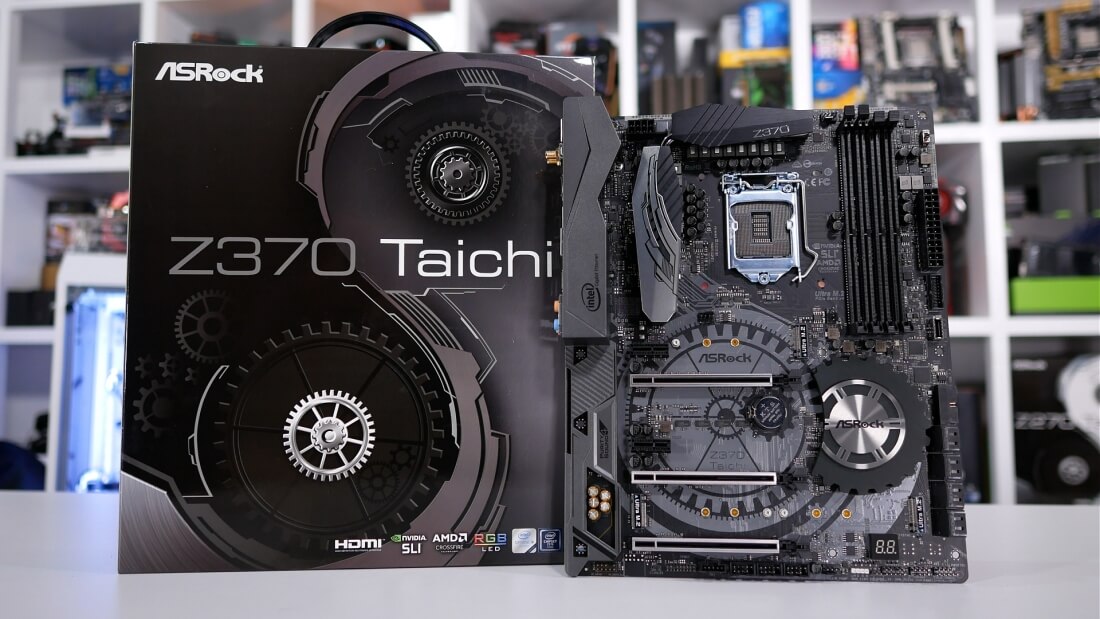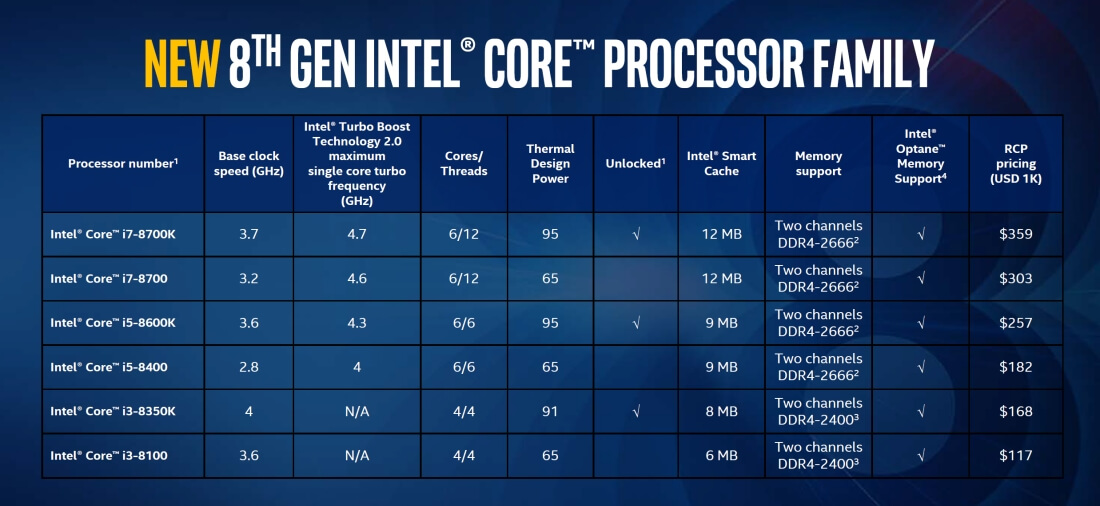It's been almost eleven years since Intel released its first quad-core desktop CPU, the glued-together Core 2 Quad Q6600, and what a glorious processor it was. The 65nm quad-core chip operated at 2.4 GHz, but back then boost clocks weren't a thing and CPUs operated on a front side bus.
Since then we've seen eight major architectural updates and four die shrinks spanning a decade. Yet after all that time, Intel still only offers up to four cores on its mainstream processors, the latest of which was released in January as the $340 Kaby Lake Core i7-7700K.
Shortly after that, AMD did something we all hoped they'd do (even if we weren't convinced they could) by releasing a highly competitive CPU architecture. Ryzen certainly disrupted Intel's 'business as usual' type of attitude in the PC market and it's been fireworks ever since.
AMD hit Intel the hardest by offering more cores for less money, which was kind of the strategy with Bulldozer, but this time the cores didn't completely suck. IPC performance is slightly below Intel's latest and greatest but Ryzen's efficiency is excellent, so AMD isn't giving anything up here. The biggest advantage Intel has right now is its superior clock speeds and this is something AMD hopes to address next year.
Before AMD can do that, Intel is hitting back with its eighth-generation Core series, which counters Ryzen with cores, lots of cores. Although Ryzen 7 will still have a core count advantage, Intel is now making six cores the standard for their higher-end parts. The new Core i5 and Core i7 processors now pack six cores and that's going to have a considerable impact.
On hand today we have a flagship part, the Core i7-8700K, which is based on Intel's new "Coffee Lake" architecture. We also have the Core i5-8400, but we'll be looking at that CPU separately in the coming days. We do not have the Core i5-8600K yet, but the plan is to get one of those shortly, too. For now, let's focus on the big guy and with six cores and 12 threads, the 8700K certainly means business.
Designed to operate no slower than 3.7 GHz, it will boost a single core as high as 4.7 GHz, and under full load should maintain an operating frequency of 4.3 GHz. Each of the six-core processors features a 256KB L2 cache while there is a much larger 12MB L3 cache. Intel has given the chip a 95 watt TDP rating and once again they are using the LGA 1151 socket, though this can be considered a second version that is in no way compatible with previous Kaby Lake or Skylake CPUs.
Pricing has been adjusted from the 7700K as the 8700K, a $20 price hike which comes in at a rather steep $360.
That also makes the 8700K $60 more expensive than AMD's Ryzen 7 1700, the company's cheapest and unlocked Ryzen 7 part. The 1700X is also priced at $360, but smart shoppers will opt for the cheaper non-X model and I've had just as much luck overclocking both to 4 GHz.
Unlike the high-end desktop Skylake-X parts on the LGA 2066 platform, the new Coffee Lake CPUs still use the ring bus and not the mesh inter-connect method of the higher core count parts. This is great news and it means the 8700K will maintain the 7700K's gaming prowess and should in fact be able to take things to the next level in this category. So without wasting any more time, let's see how this thing handles...
Ryzen Threadripper System Specs
|
Kaby Lake System Specs |
Ryzen 7 System Specs |
Skylake-X System Specs |
Coffee Lake System Specs
|
|
Benchmark Time
Memory and Application Performance
First up let's check out the memory bandwidth performance. These DDR4 dual-channel memory controllers look to be good for around 31-39GB/s of memory bandwidth when using 3200 memory. Please note all configurations were tested with the same DDR4-3200 CL4 memory.

First up, let's check out the memory bandwidth performance. Please note all CPUs were tested using DDR4-3200 CL14 memory. That in mind, it's interesting to note that the Core i7-8700K takes a step forward here from the 7700K and is now on par with the Ryzen 5 CPUs with around 36GB/s of memory bandwidth. That said, it's still trailing the Ryzen 7 models by around 2GB/s.
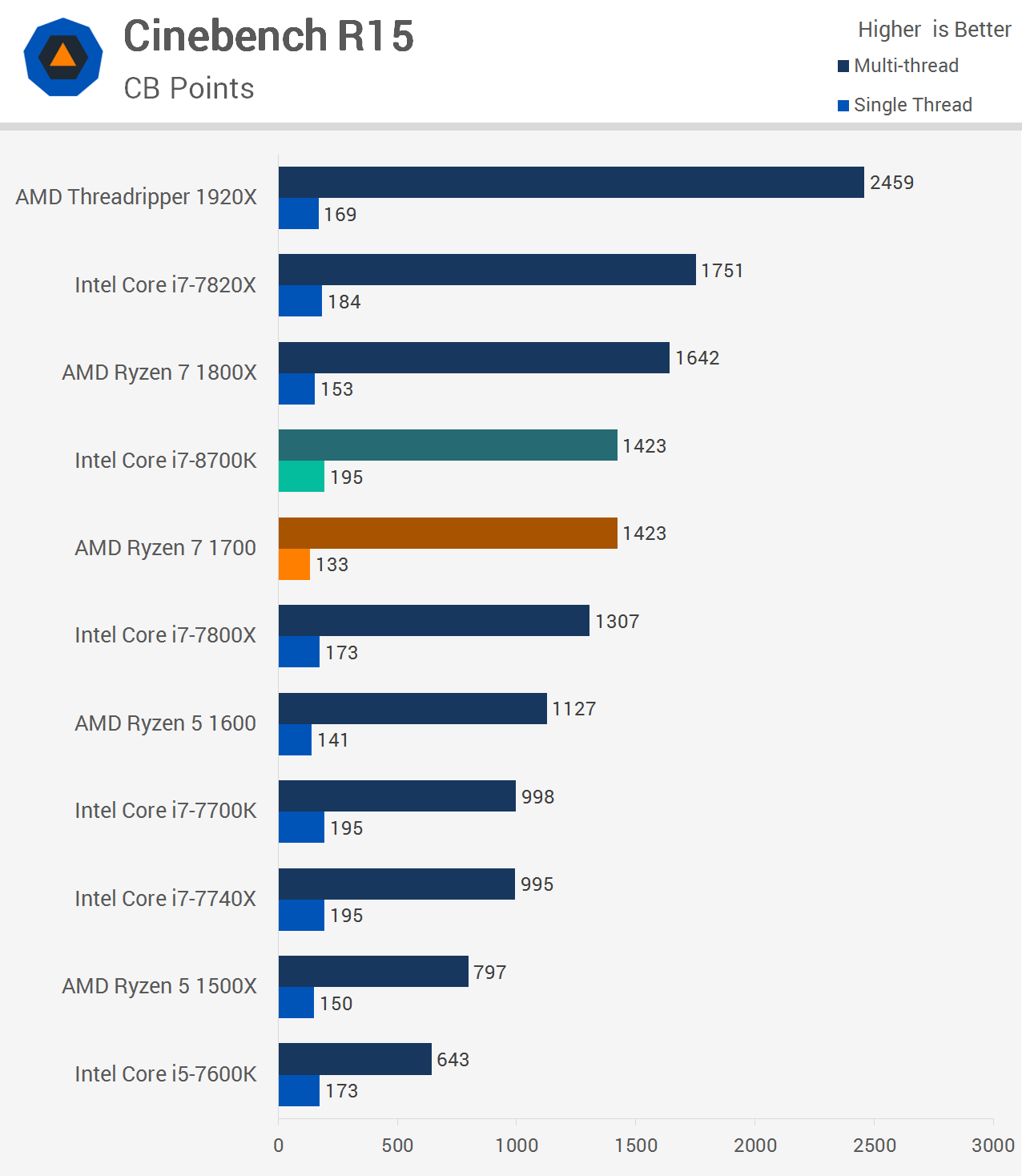
Okay so let's check out the Cinebench R15 scores. As luck would have it, after a three run average the 8700K matched the R7 1700 with a multi-threaded score of 1423 pts. That did mean it was 13% slower than the 1800X, but still an impressive result all the same.
Actually, what was impressive is its single core score and this explains how a six-core Intel CPU kept pace with an eight-core AMD CPU. The 8700K provides the same 195 point single thread score as the 7700K and by extension the 7740X. So the 8700K is looking pretty solid all round, it also completely dusts the Core i7-7800X as well so our condolences if you bought one of those recently.

Moving on we have PCMark 10 and this gives us a look at how the CPUs compare in more general use case scenarios. Core count isn't that important for the most part, it's really all about frequency. For this reason the Core i7-8700K does extremely well, outscoring the 7700K by a 5% margin.
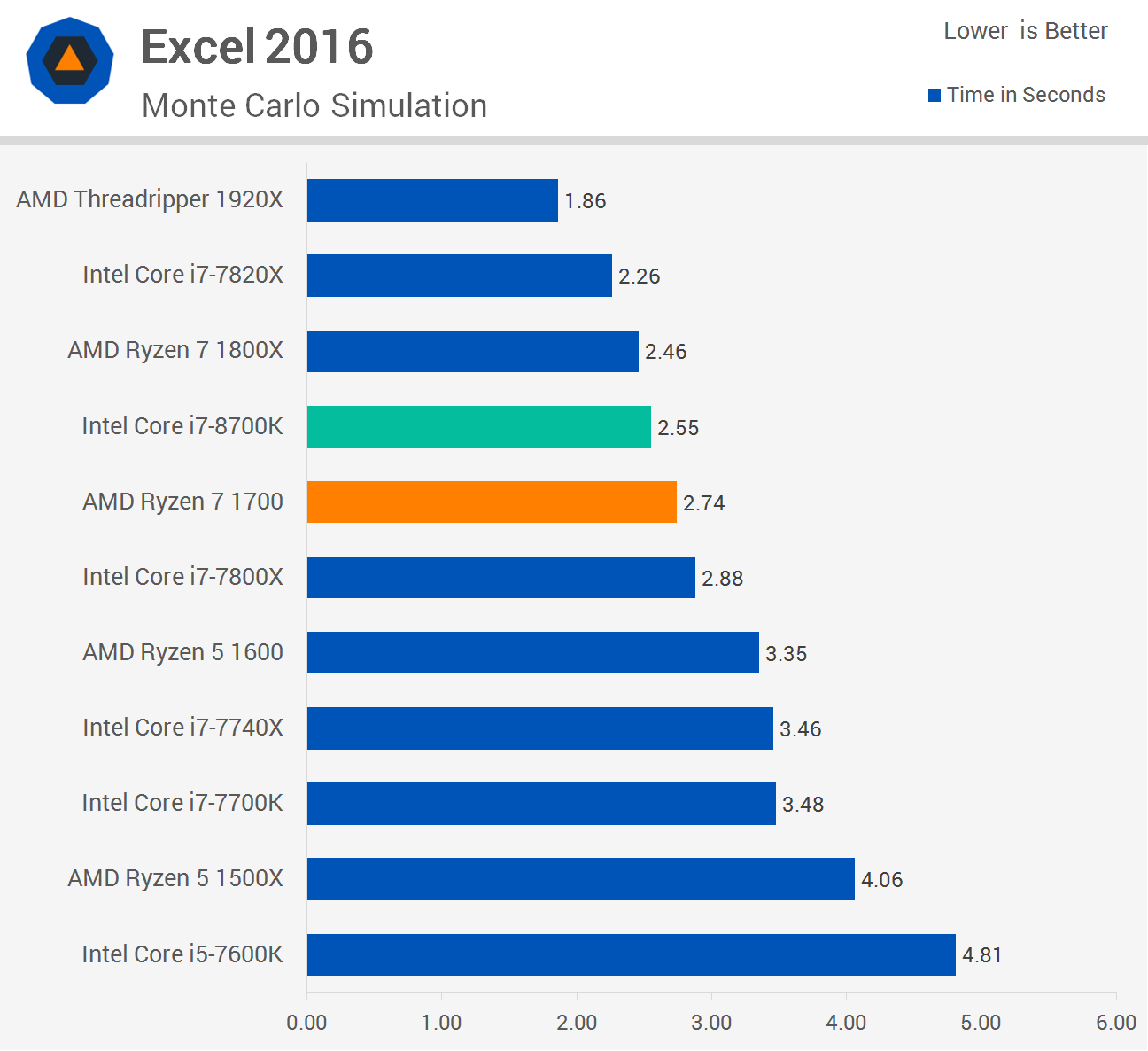
Excel is an office type benchmark which can utilize many threads, especially when running the extreme Monte Carlo simulation. The 8700K finds itself situated between the Ryzen 7 1700 and 1800X with a completion time of 2.55 seconds. This also makes it around 13% faster than Intel's six-core 7800X.
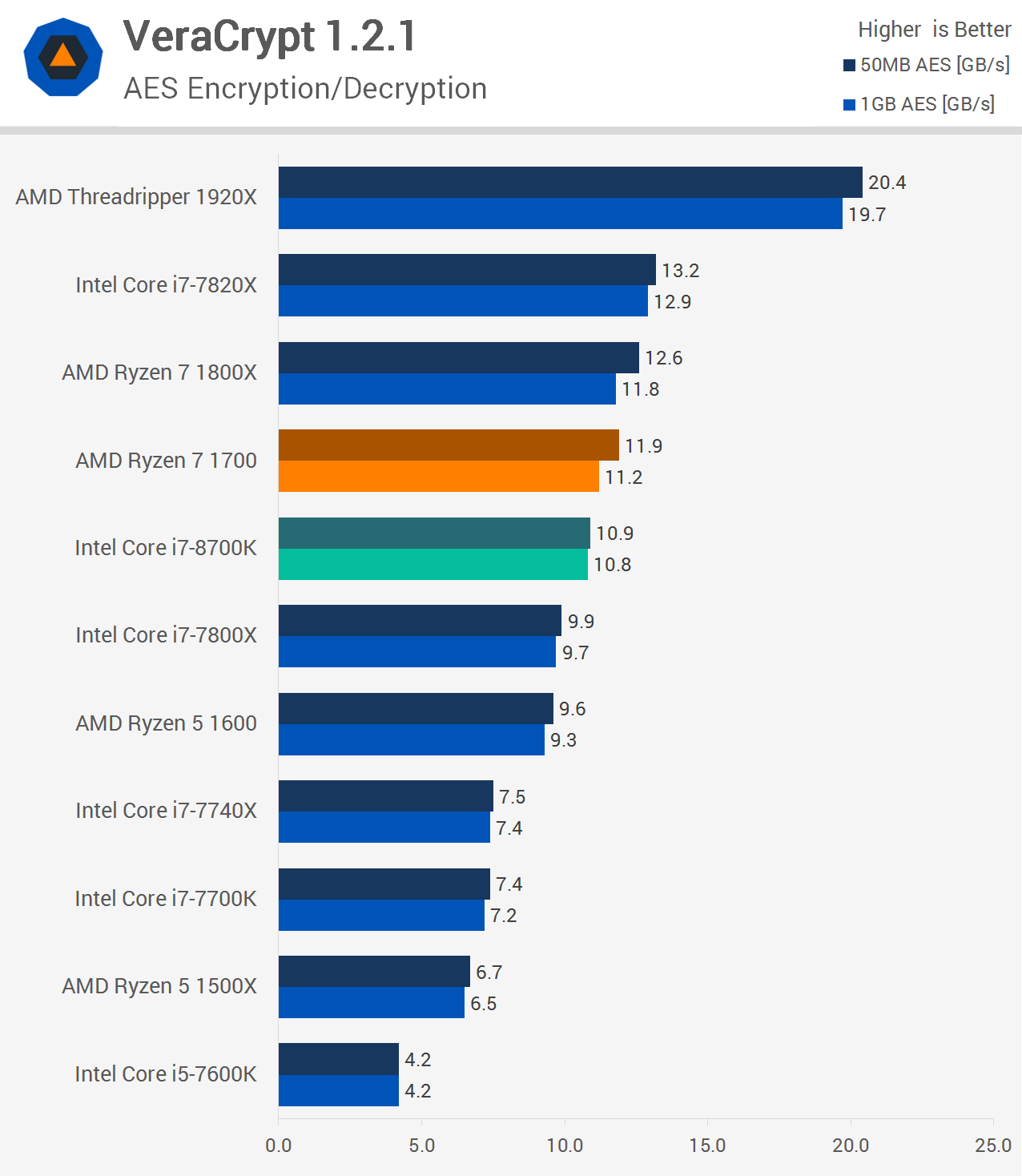
Testing with VeraCrypt we see that this time the 8700K trails the Ryzen 7 1700 though it is still around 10% faster than the Core i7-7800X and 14% faster than AMD's 6-core R5 1600.
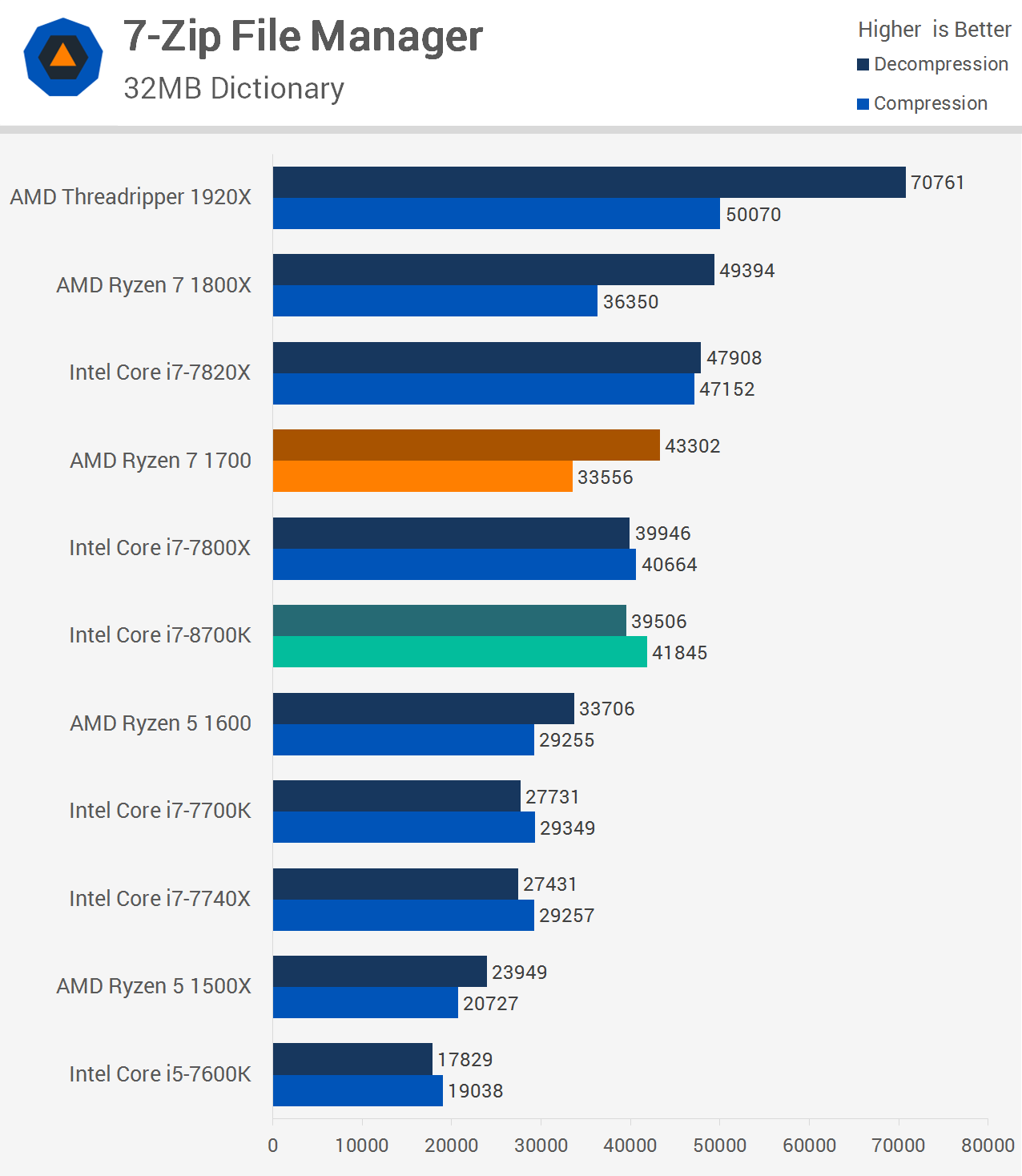
Next up we have non-encrypted compression and decompression performance using 7-Zip. The Core i7-8700K was able to out perform the Ryzen 7 1700 by a decent margin when compressing data while it was only a fraction slower when decompressing. The 8700K also edged out the 7800X for the compression test as well.

